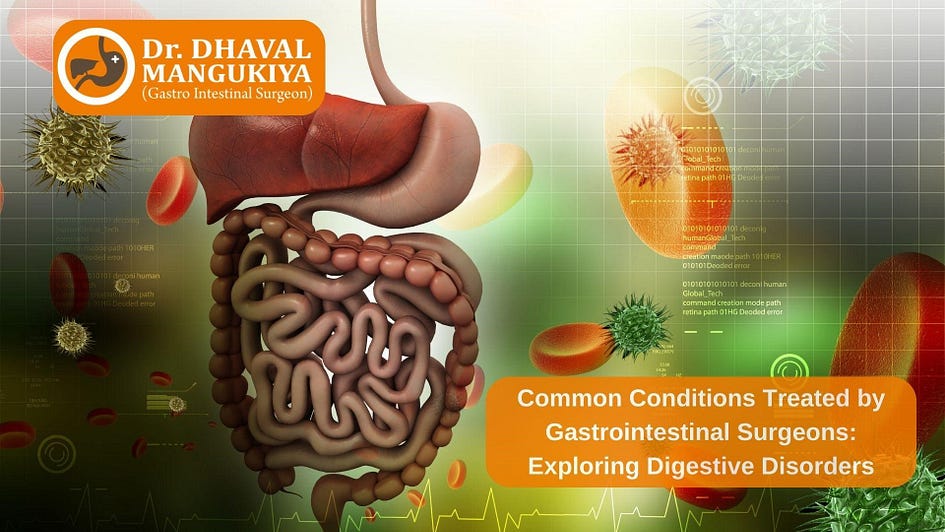Common Conditions Treated by Gastrointestinal Surgeons: Exploring Digestive Disorders

Digestive disorders encompass a wide range of conditions that affect the gastrointestinal (GI) tract, including the oesophagus, stomach, small intestine, colon, rectum, and anus. While many digestive issues can be managed through nonsurgical interventions, some may require the expertise of gastrointestinal surgeons to provide surgical treatment and relief. In this blog, Dr Dhaval Mangukiya, one of the best laparoscopic surgeons in Surat, shares information about the most common conditions treated by gastrointestinal surgeons, shedding light on these complex disorders and the surgical interventions used to address them.
Gallstones and Gallbladder Disease
Gallstones are hardened deposits that form in the gallbladder, a small organ located beneath the liver. When gallstones become symptomatic or lead to complications such as gallbladder inflammation (cholecystitis) or blockage of the bile ducts, surgical intervention may be necessary. Some of the best gastrointestinal surgeons in Surat, like Dr Dhaval Mangukiya, perform procedures such as laparoscopic cholecystectomy to remove the gallbladder and alleviate symptoms associated with gallstones and gallbladder disease.
Appendicitis
Appendicitis is inflammation of the appendix, a small pouch attached to the large intestine. If left untreated, appendicitis can lead to a ruptured appendix, a life-threatening condition requiring emergency surgery. Gastrointestinal surgeons perform an appendectomy to remove the inflamed appendix and prevent complications. Laparoscopic appendectomy, a minimally invasive procedure, is commonly used by the best gastro surgeons in Surat for uncomplicated cases of appendicitis, resulting in shorter recovery times and less postoperative pain.
Hernias
Hernias occur when organs or tissues protrude through weakened areas of the abdominal wall. Common types of hernias include inguinal hernias (occurring in the groin area), umbilical hernias (around the belly button), and hiatal hernias (involving the diaphragm and upper stomach). Gastrointestinal surgeons perform hernia repair surgeries to strengthen the abdominal wall and reposition herniated organs or tissues. Depending on the type and severity of the hernia, surgical techniques may include open repair or laparoscopic techniques with mesh reinforcement.
Gastroesophageal Reflux Disease (GERD)
GERD is a chronic digestive disorder characterized by the reflux of stomach acid into the oesophagus, leading to symptoms such as heartburn, regurgitation, and chest pain. While GERD can often be managed with lifestyle modifications and medications, some individuals may require surgical intervention to alleviate symptoms and prevent complications such as Barrett’s oesophagus or oesophageal cancer. Gastrointestinal surgeons may perform procedures such as fundoplication to reinforce the lower oesophageal sphincter and reduce reflux.
Diverticulitis
Diverticulitis is inflammation or infection of small pouches (diverticula) that form in the walls of the colon. Severe cases of diverticulitis, characterized by symptoms such as abdominal pain, fever, and bowel changes, may require surgical treatment. Gastrointestinal surgeons perform procedures such as bowel resection to remove the affected portion of the colon and repair any perforations or fistulas. In some cases, a temporary colostomy or ileostomy may be necessary to divert stool away from the affected area during the healing process.
Colorectal Cancer
Colorectal cancer is cancer that develops in the colon or rectum, often starting as precancerous polyps that can be detected and removed during screening colonoscopies. When colorectal cancer is diagnosed, surgical removal of the tumour and surrounding tissue is typically the primary treatment. Gastrointestinal surgeons perform procedures such as colectomy or rectal resection to remove the cancerous tissue and may also perform lymph node dissection to assess the spread of cancer.
Inflammatory Bowel Disease (IBD)
Inflammatory bowel disease (IBD), including Crohn’s disease and ulcerative colitis, is characterized by chronic inflammation of the digestive tract. While medical management is often the first-line treatment for IBD, Dr Dhaval Mangukiya, one of the best stomach surgeons in Surat, says surgery may be necessary in cases of severe disease, complications, or failure of medical therapy. Gastrointestinal surgeons perform procedures such as bowel resection, strictureplasty, or ileal pouch-anal anastomosis (IPAA) to remove diseased segments of the intestine, alleviate symptoms, and improve quality of life for individuals with IBD.
Conclusion
Gastrointestinal surgeons play a critical role in the management of common digestive disorders. These surgeons may sometimes have to resort to surgical interventions to alleviate symptoms, prevent complications, and improve quality of life for individuals affected by these conditions. From gallbladder disease to colorectal cancer, surgical treatment options offer hope and healing for patients facing a wide range of gastrointestinal challenges.
Comments
Post a Comment